

AI and facial recognition used for first time in job interviews in UK to find best applicants. UK police say 92% false positive facial recognition is no big deal. A British police agency is defending (this link is inoperable for the moment) its use of facial recognition technology at the June 2017 Champions League soccer final in Cardiff, Wales—among several other instances—saying that despite the system having a 92-percent false positive rate, "no one" has ever been arrested due to such an error.
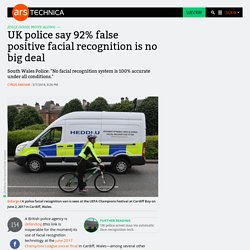
81% of 'suspects' flagged by Met's police facial recognition technology innocent, independent report says. Four out of five people identified by the Metropolitan Police's facial recognition technology as possible suspects are innocent, according to an independent report.

Researchers found that the controversial system is 81% inaccurate - meaning that, in the vast majority of cases, it flagged up faces to police when they were not on a wanted list. The force maintains its technology only makes a mistake in one in 1,000 cases - but it uses a different measurement to arrive at this conclusion. Facial recognition tech: watchdog calls for code to regulate police use. The information commissioner has expressed concern over the lack of a formal legal framework for the use of facial recognition cameras by the police.
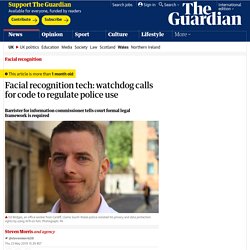
A barrister for the commissioner, Elizabeth Denham, told a court the current guidelines around automated facial recognition (AFR) technology were “ad hoc” and a clear code was needed. In a landmark case, Ed Bridges, an office worker from Cardiff, claims South Wales police violated his privacy and data protection rights by using AFR on him when he went to buy a sandwich during his lunch break and when he attended a peaceful anti-arms demonstration. The technology maps faces in a crowd and then compares them with a watchlist of images, which can include suspects, missing people or persons of interest to the police.
The cameras have been used to scan faces in large crowds in public places such as streets, shopping centres, football crowds and music events such as the Notting Hill carnival. Police facial recognition surveillance court case starts. Media playback is unsupported on your device The first major legal challenge to police use of automated facial recognition surveillance has begun in Cardiff today.
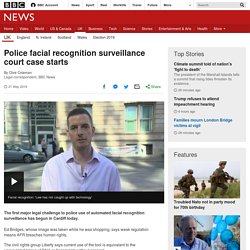
Ed Bridges, whose image was taken while he was shopping, says weak regulation means AFR breaches human rights. Big Brother Watch Begins Landmark Legal Challenge to Police Use of Facial Rec... Big Brother Watch and Baroness Jenny Jones have issued proceedings in the High Court, in a crowdfunded legal challenge to the Home Secretary and Metropolitan Police’s use of “Orwellian” facial recognition cameras.
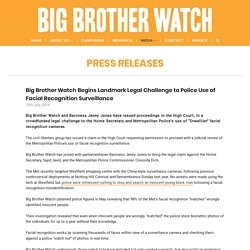
Facial recognition at South Wales derby 'a step too far', says police chief. One of the most senior policing figures in Wales has warned that the use of facial recognition technology at the country’s biggest football derby this weekend could create miscarriages of justice.
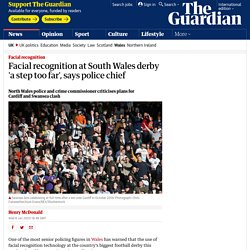
Arfon Jones, a veteran Welsh police officer and the North Wales police and crime commissioner, has expressed grave concern about the deployment of the surveillance technology at Sunday’s clash between Cardiff City and Swansea City. Civil liberties and fan groups have also criticised South Wales police’s decision to train cameras on supporters and employ facial recognition on them at the Cardiff City stadium. Facial-recognition-uk-police-london-inaccurate-legal-challenge-judicial-revie... Www.bbc.co. Uk.businessinsider. Visitors viewing a display of electronic facial-recognition technology that claims to be able to detect when students are talking or looking at their cellphones at the 21st China Beijing International High-tech Expo in Beijing.AP Photo/Mark Schiefelbein A Chinese high school in Hangzhou is using facial-recognition technology that scans students every 30 seconds.The system is analyzing students' emotions and actions in the classroom as well as replacing ID cards and wallets at the library and canteen.Facial-recognition technology is widespread in China, where it is being used to predict crime.But using the systems in schools has raised privacy concerns, and last year hundreds of channels livestreaming classroom surveillance footage online was shut down.

A Chinese high school is using facial-recognition technology to monitor and analyze students' behavior. But security systems are rising in popularity after an increase in violence and questionable practices at Chinese kindergartens. News.sky. Amp.theguardian. Police are facing calls to halt the use of facial recognition software to search for suspected criminals in public after independent analysis found matches were only correct in a fifth of cases and the system was likely to break human rights laws.
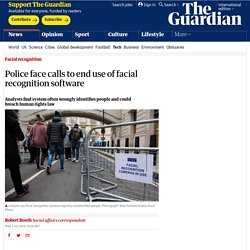
Academics from the University of Essex were granted access to six live trials by the Metropolitan police in Soho, Romford and at the Westfield shopping centre in Stratford, east London. They found the system regularly misidentified people who were then wrongly stopped. Inside the urgent battle to stop UK police using facial recognition.
The last day of January 2019 was sunny, yet bitterly cold in Romford, east London. Shoppers scurrying from retailer to retailer wrapped themselves in winter coats, scarves and hats. The temperature never rose above three degrees Celsius. For police officers positioned next to an inconspicuous blue van, just metres from Romford's Overground station, one man stood out among the thin winter crowds. The man, wearing a beige jacket and blue cap, had pulled his jacket over his face as he moved in the direction of the police officers. The reason for his camouflage? The whole incident was captured on camera by BBC journalists producing a documentary and campaigners from civil liberties group Big Brother Watch.